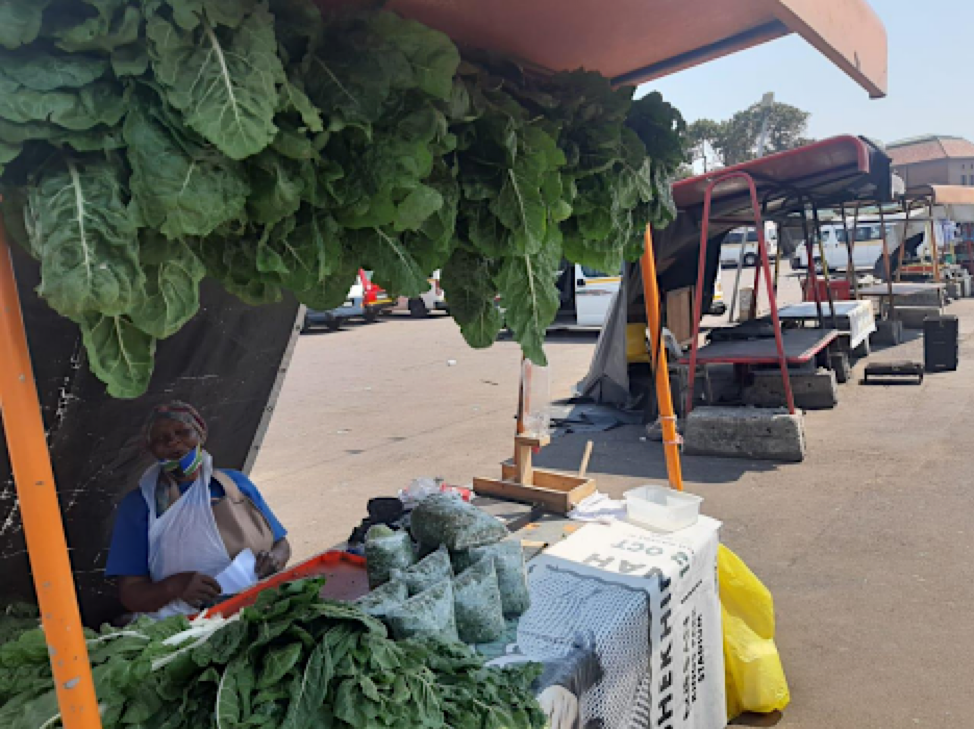Sithulisile Moyo
PART 1: #narratives of an informal worker:
Treat us with dignity
“They need to stop impounding our goods. Find other ways to harass us. Sondl’ imndeni ngalamatafula”.
It’s in the wee hours of the day at an informal settlement in Kwandengezi, MaNgcobo is busy preparing for the long day ahead working at the Early Morning Market in Durban. It’s a historic informal market that has been a hub of survival for thousands of other traders who work in this market and so has been the struggles of the majority of the informal traders in this market. They can be dated way back into the post apartheid epoch where a young energetic Mangcobo was first introduced into this sector; her mother had been an informal trader since 1985, a job she undertook when her father had left for the mines to fend for
the family. As she boards the train to the market, nostalgic yet painful memories haunt her journey. A widowed mother of two who has single handedly raised her kids since 2015 following the fateful death of her husband in a tragic taxi collision. Life has never been the same since that incident. Yet as the sun rises this morning , so does the glimpse of hope for Mangcobo that all shall work out for the better as she is boarding off at the market.
Seven AM. The congested market. The buzzing vehicles shamelessly polluting the climate. The faint yet wheezing sound of the wind. The ever busy barrow operators transporting the last batch of the traders goods to their designated destinations. It’s Mpilo, the barrow operator who works for MaNgcobo. She recognises him and gladly walks towards the market entrance, hopeful for a better day this morning . The market entrance. It’s the sight of a metro police officer that suddenly turns the tranquil place into a sombre atmosphere. Mangcobo and other thousands of informal workers have suffered a lot at the hands of the harsh enforcement of these officials. At that moment, I am taken aback as l remember what one trader once said during our regular AeT incident forums;
“I barely sleep at night , thinking how am l going to survive the next morning on the streets. My job is uncertain. How will l look after my children if the police show up again to confiscate my goods?. Sometimes, I don’t make profit as l have to constantly run and hide from the police”.
Mangcobo echoes similar sentiments. She has been a victim of these endless confiscations that are ravaging the markets at least twice weekly. A gross systemic failure that not only excludes these marginalised workers but indirectly prejudices their only chance at earning decent livelihoods in public spaces. Permits they say. We never refused to comply with the enacted laws yet the application process itself is a long tenuous procedure , let alone chances of a successful application are as slim as finding a needle in a haystack.
“It’s been a long time trying to secure a permit. We have other people getting them without even applying”. We need a transparent system on these permits”.
“I have never owned a permit for the past 13years. I always apply only to get to the waiting list and that’s it”.
The market entrance. A few meters away stands the ablution facilities , not a pleasant odour emanating therein, but definitely serves a purpose of relief . These usually open at around 9am which is a huge challenge for the traders who start working at 6am. A man is standing outside the door to find it still locked and he resorts to using the ablution walls instead. These are some of the challenges we encounter in our marketplaces , says Mangcobo.
In lieu of stringent regulatory rules and mechanisms , the legislature and the municipality (its employees) who are directly interacting with informal workers on the ground must make a conscious decision to learn
and educate themselves and the communities on the dynamics of informality and its context . The promulgation of countless pieces of legislation is not the solution. There is a dire need to reform the existing laws and policies to be in compliance with standards and norms of ubuntu and compassion. It is the realities of the informal workers on the ground that must inform legislation, not the imaginary precepts of what the legislators deem as a developed city. Informality is our reality and it’s here to stay. The ball is in our court, either we embrace and properly administrate informality or we await a ticking time bomb that will be unmanageable in the near future. Informal work is work and earning decent livelihoods for their families is an integral part of human dignity as encapsulated in the Constitution. What we need now is an urgent moratorium on permits. We are not being creative and constructive. We need a planning scheme that looks at trading thresholds and spatial and management dictates that can be jointly negotiated. We need a new paradigm. #STOPcriminalizationofpoverty #GiveuspermitsNOW
[Featured image: Informal trader at stand. Photo: Misiwe Maphumulo, Asiye eTafuleni]


